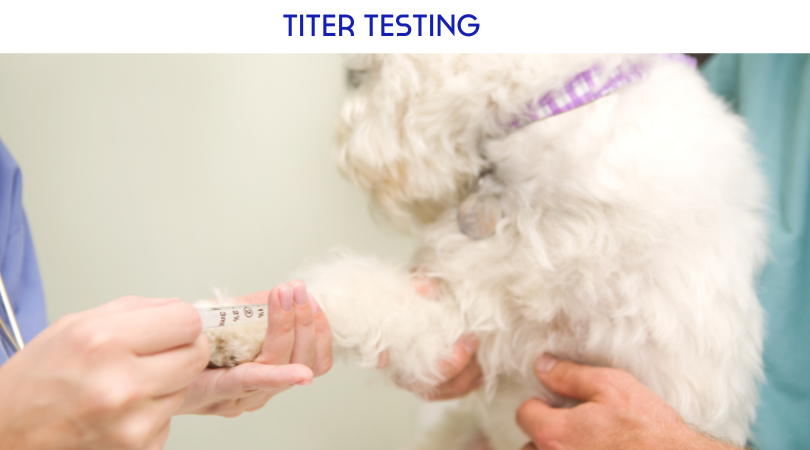Titers and Immunity: What You Need to Know for Your Pet's Health
Posted by Jewel on Sep 07, 2024
When it comes to the health and well-being of our pets, especially in the context of vaccinations and immunity, there’s a lot of confusion. One of the key areas of misunderstanding is how immunity is measured and maintained in our pets. Today, we’re diving into the subject of titer tests and immunity, and how these affect the choices we make for our beloved furry companions.
What Are Titers?
A titer test is a blood test that measures the level of antibodies in your pet’s system. These antibodies are proteins produced by the immune system in response to an exposure to a virus, whether through infection or vaccination.
Titers can be a useful tool to check if a pet has been exposed to a virus or whether there are antibodies present in the bloodstream, but they don’t tell the whole story when it comes to true immunity.
Why Titers Don’t Measure Immunity Completely
Here’s the key: a titer test cannot fully measure immunity. Immunity to specific viruses doesn’t solely rely on antibodies floating around in the bloodstream. Instead, true immunity depends on memory cells. These memory cells are the unsung heroes of your pet’s immune system.
Memory cells are long-lasting immune cells that “remember” a virus the pet has encountered before. If that virus shows up again, these memory cells spring into action, prompting the immune system to create antibodies and target the virus effectively. The incredible part is that memory cells don’t need constant reminders in the form of re-vaccination to keep the immune system primed. Once these cells “learn” a virus, they hold onto that memory for a very long time—sometimes for life.
This means that just because a titer test shows a low level of antibodies, it does not mean your pet is not protected! The presence of memory cells means the immune system is ready to respond to the virus quickly if needed.
The Importance of Cellular Immunity
Titers only measure the presence of antibodies, but your pet’s immune system has another equally powerful weapon called cellular immunity, also known as the cell-mediated immune response.
This is where T-cells come into play. T-cells act as "killer" cells, attacking viruses and also taking on rogue cells such as cancer cells. This cellular immunity, while vital to your pet’s overall health, cannot be measured by a simple blood test like a titer. In other words, your pet’s body could be very capable of mounting an immune response through its cellular immunity, even if a titer shows low antibodies.
This is why it’s so important not to focus solely on antibody levels when considering your pet’s immunity. Titers provide just one piece of the puzzle.
Why Over-Vaccination Can Be Harmful
One of the major concerns in modern veterinary care is over-vaccination. Vaccines are crucial for protecting pets from deadly diseases, but repeated vaccinations beyond what's necessary can actually weaken your pet’s immune system over time.
When pets are vaccinated too frequently, it can overwhelm their immune systems, leading to chronic inflammation, allergic reactions, and, in some cases, cancer. The immune system gets bombarded by constant reminders from vaccines, potentially diminishing its natural response. In the worst cases, this can lead to immune system suppression, making your pet more vulnerable to diseases in the long run.
The Connection Between Over-Vaccination and Cancer
There is growing evidence that over-vaccination may contribute to the rise in cancer rates in our pets. When the immune system is constantly bombarded by vaccines, it can trigger an abnormal response where the body starts attacking its own cells or fails to fight off abnormal cells like cancer.
Cancer in pets is, unfortunately, on the rise, and part of the reason could be that their immune systems are being compromised by unnecessary vaccinations. By weakening the immune response, vaccines can leave our pets vulnerable to diseases that their natural immune system—if left healthy—could have potentially fought off.
How to Support Your Pet’s Immune System Naturally
Given all this, it’s more important than ever to support your pet’s immune system naturally. Here are a few holistic ways to help your pet maintain a strong immune system:
- Diet: Feed your pet a species-appropriate, whole-food diet rich in high-quality proteins and low in processed carbs. Fresh, nutrient-dense food can make a world of difference in your pet’s immunity.
- Probiotics: A healthy gut is the foundation of a strong immune system. Incorporating probiotics helps keep the gut balanced and supports your pet’s overall health.
- Herbs and Mushrooms: Medicinal mushrooms like reishi and turkey tail, along with herbs like turmeric and ginger, can boost your pet’s immune response.
- Minimize Toxins: Reduce your pet’s exposure to chemicals and toxins in their environment. This includes everything from cleaning products to flea and tick treatments. Opt for natural alternatives whenever possible.
- Holistic Care: Consider working with a holistic veterinarian who can guide you on a more natural, balanced approach to vaccinations and immune health.
The Bottom Line: Don’t Just Rely on Titers
While titer testing is a useful tool to gauge certain aspects of immunity, it is not the whole story. True immunity is much more complex and relies on memory cells and cellular immunity—neither of which are reflected in a titer test.
Keeping your pet’s immune system strong, and avoiding the pitfalls of over-vaccination, will help ensure a long, healthy life for your pet. Stay informed, stay proactive, and remember that natural immunity is the best form of defense.
Want to learn more about keeping your pet healthy and high-vibe? Join our Facebook group for more holistic tips, share your experiences with other pet lovers, and discover how to raise a healthy, happy pet naturally.
Stay high-vibe and keep your pet’s immunity strong!

